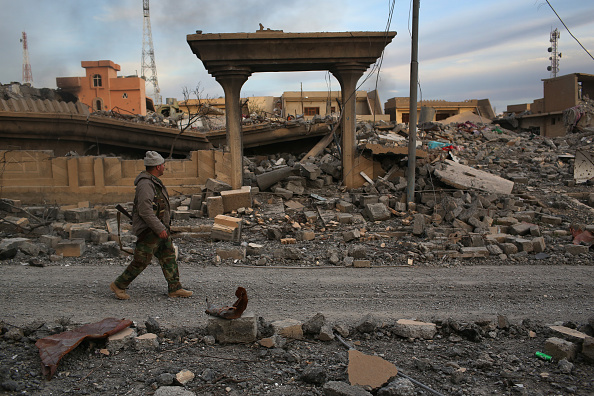In the recaptured city of Sinjar, residents say destruction by ISIS 'can't be reversed'


A free daily email with the biggest news stories of the day – and the best features from TheWeek.com
You are now subscribed
Your newsletter sign-up was successful
The city of Sinjar, Iraq, has been reclaimed from the Islamic State, but former residents say it will never be the same.
On Friday, Kurdish fighters liberated Sinjar, which the United Nations estimates was home to 350,000 people before ISIS took over the town in August 2014; two-thirds belonged to the Yazidi religious minority, and most of the rest were Muslim. The Kurdish and allied forces found homes and buildings decimated, a mass grave filled with the bodies of elderly women and men, and the minaret, a symbol of the city, destroyed. "The city will be rebuilt again, but life in the city will not be back," Yazidi fighter Marwan Hussein Ali told The Wall Street Journal. "What was done to us is something that can't be reversed."
Sinjar was on a key route that ISIS used to move weapons and money between Iraq and Syria. Kurdish fighters said that dozens of ISIS militants were killed during the assault, and a Pentagon official said coalition airstrikes killed more than 200 fighters as they tried to escape. While the Yazidis are glad to have Sinjar back, Ali said that there are still more than 1,000 kidnapped Yazidi women with ISIS fighters, being sold between militants "in exchange for a bottle of Pepsi." Other Yazidi say they are angry that their Sunni Muslim neighbors, once considered friends, didn't do more to stop ISIS — or worse, joined them in killings. A Yazidi fighter named Khalaf Dhakheel Ceedo told the Journal that they "took the honor of Yazidis," and there's "no way" they will be welcome in Sinjar.
The Week
Escape your echo chamber. Get the facts behind the news, plus analysis from multiple perspectives.

Sign up for The Week's Free Newsletters
From our morning news briefing to a weekly Good News Newsletter, get the best of The Week delivered directly to your inbox.
From our morning news briefing to a weekly Good News Newsletter, get the best of The Week delivered directly to your inbox.
A free daily email with the biggest news stories of the day – and the best features from TheWeek.com
Catherine Garcia has worked as a senior writer at The Week since 2014. Her writing and reporting have appeared in Entertainment Weekly, The New York Times, Wirecutter, NBC News and "The Book of Jezebel," among others. She's a graduate of the University of Redlands and the Columbia University Graduate School of Journalism.
-
 Political cartoons for February 16
Political cartoons for February 16Cartoons Monday’s political cartoons include President's Day, a valentine from the Epstein files, and more
-
 Regent Hong Kong: a tranquil haven with a prime waterfront spot
Regent Hong Kong: a tranquil haven with a prime waterfront spotThe Week Recommends The trendy hotel recently underwent an extensive two-year revamp
-
 The problem with diagnosing profound autism
The problem with diagnosing profound autismThe Explainer Experts are reconsidering the idea of autism as a spectrum, which could impact diagnoses and policy making for the condition
-
 British warship repels 'largest Houthi attack to date' in the Red Sea
British warship repels 'largest Houthi attack to date' in the Red SeaSpeed read Western allies warn of military response to Iranian-backed Yemeni rebels if attacks on ships continue
-
 Houthi rebels claim Red Sea ship attacks
Houthi rebels claim Red Sea ship attacksspeed read Iran-backed Yemeni group vows to escalate aggression towards Israel-linked vessels in revenge for Gaza war
-
 Israel plans next phase of Gaza war as first hostages released
Israel plans next phase of Gaza war as first hostages releasedSpeed read After four-day ceasefire 'we will not stop' until destruction of Hamas, says Israel
-
 Mob storms Russian airport 'looking for Jews'
Mob storms Russian airport 'looking for Jews'Speed Read Plane from Israel surrounded by rioters chanting antisemitic slogans after landing in Russia's Dagestan region
-
 Tuberville's military promotions block is upending lives, combat readiness, 3 military branch chiefs say
Tuberville's military promotions block is upending lives, combat readiness, 3 military branch chiefs saySpeed Read
-
 Ukraine's counteroffensive is making incremental gains. Does it matter in the broader war?
Ukraine's counteroffensive is making incremental gains. Does it matter in the broader war?Speed Read
-
 US commissions first-ever Navy ship in a foreign port
US commissions first-ever Navy ship in a foreign portSpeed Read
-
 British spy chief, Wagner video suggest Prigozhin is alive and freely 'floating around'
British spy chief, Wagner video suggest Prigozhin is alive and freely 'floating around'Speed Read
